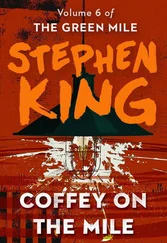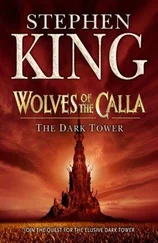“—and I carried the message, so there’s an end to it. Put a sign in the window. MARKET CLOSED UNTIL FURTHER NOTICE.”
“Pete. Look. Be reasonable.” Ernie no longer seemed angry; now he seemed almost to be pleading. “That’ll scare the dickens out of people. If you’re set on this, how about I put CLOSED FOR INVENTORY, WILL REOPEN SOON? Maybe add SORRY FOR THE TEMPORARY INCONVENIENCE. Put TEMPORARY in red, or something.”
Peter Randolph shook his head slowly and weightily. “Can’t let you, Ern. Couldn’t let you even if you were still an official employee, like him.” He nodded to Jack Cale, who had put down the inventory sheets so he could torture his hair with both hands. “CLOSED UNTIL FURTHER NOTICE. That’s what the Selectmen told me, and I carry out their orders. Besides, lies always come back to bite you on the ass.”
“Yeah, well, Duke Perkins would have told them to take this particular order and wipe their asses with it,” Ernie said. “You ought to be ashamed, Pete, carrying that fat shit’s water. He says jump, you ask how high.”
“You want to shut up right now, if you know what’s good for you,” Randolph said, pointing at him. The finger shook a little. “If you don’t want to spend the rest of the day in jail on a disrespect charge, you just want to close your mouth and follow orders. This is a crisis situation—”
Ernie looked at him unbelievingly. “ ‘Disrespect charge?’ No such animal!”
“There is now. If you don’t believe it, go on and try me.”
Later on—much too late to do any good—Julia Shumway would piece together most of how the Food City riot started, although she never got a chance to print it. Even if she had, she would have done so as a pure news story: the five Ws and the H. If asked to write about the emotional heart of the event, she would have been lost. How to explain that people she’d known all her life—people she respected, people she loved—had turned into a mob? She told herself I could’ve gotten a better handle on it if I’d been there from the very beginning and seen how it started, but that was pure rationalization, a refusal to face the orderless, reasonless beast that can arise when frightened people are provoked. She had seen such beasts on the TV news, usually in foreign countries. She never expected to see one in her own town.
And there was no need for it. This was what she kept coming back to. The town had been cut off for only seventy hours, and it was stuffed with provisions of almost every kind; only propane gas was in mysteriously short supply.
Later she would say, It was the moment when this town finally realized what was happening. There was probably truth in the idea, but it didn’t satisfy her. All she could say with complete certainty (and she said it only to herself) was that she watched her town lose its mind, and afterward she would never be the same person.
The first two people to see the sign are Gina Buffalino and her friend Harriet Bigelow. Both girls are dressed in white nurse’s uniforms (this was Ginny Tomlinson’s idea; she felt the whites inspired more confidence among the patients than candy-striper pinafores), and they look most seriously cute. They also look tired, in spite of their youthful resiliency. It has been a hard two days, and another is ahead of them, after a night of short sleep. They have come for candy bars—they will get enough for everyone but poor diabetic Jimmy Sirois, that’s the plan—and they are talking about the meteor shower. The conversation stops when they see the sign on the door.
“The market can’t be closed,” Gina says unbelievingly. “It’s Tuesday morning.” She puts her face to the glass with her hands cupped to the sides to cut the glare of the bright morning sun.
While she’s so occupied, Anson Wheeler drives up with Rose Twitchell riding shotgun. They have left Barbie back at Sweet-briar, finishing up the breakfast service. Rose is out of the little panel truck with her namesake painted on the side even before Anson has turned off the engine. She has a long list of staples, and wants to get as much as she can, as soon as she can. Then she sees CLOSED UNTIL FURTHER NOTICE posted on the door.
“What the hell? I saw Jack Cale just last night, and he never said a word about this.”
She’s speaking to Anson, who’s chugging along in her wake, but it’s Gina Buffalino who answers. “It’s still full of stuff, too. All the shelves are stocked.”
Other people are pulling in. The market is due to open in five minutes, and Rose isn’t the only one who planned to get an early start on her marketing; folks from all over town woke up to find the Dome still in place and decided to stock up on supplies. Asked later to explain this sudden rush of custom, Rose would say: “The same thing happens every winter when the Weather Bureau upgrades a storm warning to a blizzard warning. Sanders and Rennie couldn’t have picked a worse day to pull this bullshit.”
Among the early arrivals are Units Two and Four of the Chester’s Mill PD. Close behind them comes Frank DeLesseps in his Nova (he’s ripped off the ASS, GAS, OR GRASS sticker, feeling it hardly becomes an officer of the law). Carter and Georgia are in Two; Mel Searles and Freddy Denton in Four. They have been parked down the street by LeClerc’s Maison des Fleurs, by order of Chief Randolph. “No need to get there too soon,” he has instructed them. “Wait until there are a dozen or so cars in the parking lot. Hey, maybe they’ll just read the sign and go home.”
This doesn’t happen, of course, just as Big Jim Rennie knew it wouldn’t. And the appearance of the officers—especially such young and callow ones, for the most part—acts as an incitement rather than a calmative. Rose is the first to begin haranguing them. She picks on Freddy, showing him her long list of supplies, then pointing through the window, where most of the stuff she wants is ranked neatly on the shelves.
Freddy is polite to begin with, aware that people (not quite a crowd, not yet) are watching, but it’s hard to keep his temper with this mouthy little pipsqueak in his face. Doesn’t she realize he’s only following orders?
“Who do you think is feeding this town, Fred?” Rose asks. Anson puts a hand on her shoulder. Rose shakes it off. She knows Freddy is seeing rage instead of the deep distress she feels, but she can’t help it. “Do you think a Sysco truck full of supplies is just going to parachute down from the sky?”
“Ma’am—”
“Oh, can it! Since when am I a ma’am to you? You’ve been eating blueberry pancakes and that nasty limp bacon you like at my place four and five days a week for twenty years, and calling me Rosie while you did it. But you won’t be eating pancakes tomorrow unless I get some flour and some shortening and some syrup and…” She breaks off. “Finally! Sense! Thank You, God!”
Jack Cale is opening one of the double doors. Mel and Frank have taken up station in front of it, and he has just room to squeeze between them. The prospective shoppers—there are nearly two dozen now, even though the market’s official opening time of nine AM is still a minute away—surge forward, only to stop when Jack selects a key from the bunch on his belt, and locks up again. There’s a collective groan.
“Why the hell’d you do that?” Bill Wicker calls out indignantly. “My wife sent me down for aigs!”
“Take it up with the Selectmen and Chief Randolph,” Jack responds. His hair is raring every whichway. He throws Frank DeLesseps a black look and fires an even blacker one at Mel Searles, who is trying unsuccessfully to suppress a grin, perhaps even his famous nyuck-nyuck-nyuck. “I know I will. But for now, I’ve had enough of this shit. I’m done.” He strides off through the crowd with his head down and his cheeks burning even brighter than his hair. Lissa Jamieson, just arriving on her bicycle (everything on her list will fit into the milk box perched on the rear fender; her wants are small-going-on-minuscule), has to swerve to avoid him.
Читать дальше











